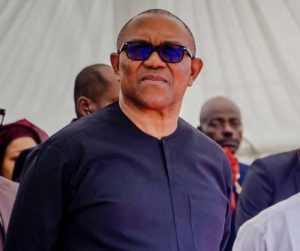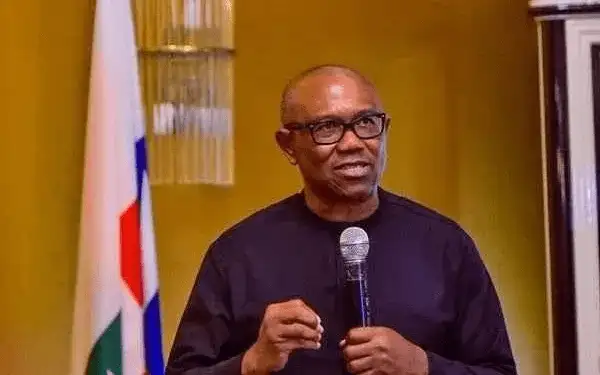By Clement Abayomi
“Peter Obi, my good friend . . . and a very excellent person . . . . I think he will make some name now . . . around 2027/2031, he may be able to make it, but . . .”
Those were the words of former Niger State governor, Mu’azu Babangida Aliyu of the PDP who reflected on Obi’s political journey. Arguments have intensified over Obi’s relevance ahead of the 2027 presidential election, following his powerful emergence in the 2023 presidential election. Aliyu, while acknowledging Obi’s competence, had initially maintained that his (Obi’s) widespread national acceptance is still growing and suggested that his stronger prospects might emerge in the 2027 or 2031 cycle rather than in 2023.
READ ALSO: Peter Obi dismisses fears of Atiku hijacking ADC ticket ahead of 2027 polls
The ongoing discussion around Peter Obi‘s political future remains prominent given his performance in the 2023 presidential election. Obi finished third behind APC’s Bola Ahmed Tinubu, who won, and Atiku Abubakar of the PDP, who came second. According to Premium Times, both Atiku and Obi challenged Tinubu’s victory, alleging widespread electoral malpractices. To many Nigerians, Obi’s candidacy was seen as the most viable expression of the longstanding agitation from the South-east, where people believed the region deserved to produce Nigeria’s next president.

Interestingly, Obi has formally declared his intention to contest again. He confirmed he would run and further stated that he would respect any agreement limiting him to four years in office if such a consensus emerged.
“If there is any form of agreement that will restrict me to four years in office, I will comply with the agreement and be ready to leave office by 28th May 2031,” he said.
Obi emphasised a renewed strategy for the next election, promising a non-violent approach and insisting that electoral integrity must be assured before results are announced in Abuja. He stressed that the 2027 campaign would differ significantly from 2023.
“We will do things differently in 2027. We will follow a non-violent approach and insist that the right thing will be done before the result announcement in Abuja. Our votes in 2027 will count, and we will ensure they count,” he reiterated. This suggests a focus on transparency and process-driven participation.
However, recent events have raised serious questions about Obi’s political influence and the strength of the Labour Party. The just concluded Anambra State Governorship election presented a significant test of Obi’s ability to deliver electoral success in his home state. Despite campaigning actively for the Labour Party’s candidate, the results were disheartening. According to reports from The Nation, the election results demonstrated a crushing defeat for opposition parties, with APGA’s Professor Charles Chukwuma Soludo securing a landslide victory with 422,664 votes from approximately 584,000 valid votes cast. The APC got 99,445 votes in second place, while the YPP obtained over 37,445 votes for third position. Shockingly, the Labour Party garnered only 10,576 votes, placing fourth ahead of ADC and PDP which received even fewer votes.
The Labour Party’s fourth-place finish with only 10,576 votes appears to represent a devastating blow to Obi’s political credibility. This result suggests that his influence, even in his own geopolitical base, may be significantly weaker than previously assumed. Writing for TheCable, Jonathan Nda-Isaiah observed that the Labour Party’s electoral fortunes have dramatically declined since benefiting from the Obidient movement during the 2023 general elections. He noted that the disappointing Anambra results indicate that whatever electoral appeal the party previously enjoyed has dissipated, suggesting that political influence quickly diminishes when not properly maintained.
Public Affairs Analyst Dotun Ojon, speaking on News Central, expressed concern about some crisis within the Labour Party and its implications for Obi’s political future. He noted that many observers had hoped Obi would successfully mediate between warring factions within the party to position himself for the 2027 election. However, if the divisions persist, Ojon doubts this will benefit Obi’s political aspirations. He warned that continued infighting could leave Obi in a precarious situation.
READ ALSO: Wike blasts Obi: “You’ll only be President on social media”
“This is my fear; if the crisis continues, Peter Obi may get to a point of political orphanage. That is, a public figure, an acceptable figure, who does not have a home,” he said.
Ojon advised that unless Obi can legally intervene to unite the party’s factions, his name might not appear on future ballots.
“As a form of advice, if he can do anything possible within the limit of the law to reconcile the factions of the party and bring them together, the better for him. But if not, we may not see his name on the ballot,” he said.
Daniel Bwala, Special Adviser to the President, speaking on Channels Television about the 2023 presidential election, assessed Obi’s electoral strategy and future prospects. Bwala claimed that in the north central region, Obi employed harmful language and misled religious communities by suggesting he would restore church influence in government, which helped him secure whatever support he obtained in that area.
“The north central, Peter Obi used dangerous rhetoric and deceived the church that he is going to take the country back to the church and he got the number he could muster,” he claimed.
Discussing Obi’s prospects across PDP, ADC, and Labour Party, Bwala asserted that Obi would not secure a presidential nomination from any party. He went further to suggest that Obi might not even obtain a vice-presidential slot given current political situations. Bwala contended that Obi has forfeited more than half his previous support because those votes were not grounded in substantive policy platforms but rather in divisive rhetoric, and that Nigerian voters have become more discerning.
“As I tell you, he is not going to get a ticket in any of the parties, that is Peter Obi. The problem now is that he might not even get the vice presidential ticket from the way things are going but whether Peter Obi is a ticket bearer of the party, Peter Obi has lost more than 50% of his votes because they were not votes that were built on agenda and politics; they were built on rhetorics and division, and Nigerian people’s eyes are opened,” he said.
READ ALSO: Defections: “This isn’t military era” – Obi tells FG
Within the Labour Party, Obi’s 2023 running mate, Senator Datti Baba-Ahmed, publicly reaffirmed his loyalty and willingness to run with Obi again. He revealed this on Channels Television, stating that his commitment to Nigeria and to Obi remains firm.
“I would appropriately associate with the groups and individuals I think are like-minded . . . . There are two individuals I’d succumb to. The first one has not said it, so I’d not say it on his behalf. The second one is Peter Obi. I’m always with Peter Obi until he decides not to.”
Baba-Ahmed noted that should Nigeria’s electoral system remain intact, he would continue working towards rescuing the nation.
“If there is an electoral system to follow, my love for Nigeria is undying. Mark that . . . we will try to rescue Nigeria,” he said.
Meanwhile, the “Obidient citizens” continuously maintain that their Movement has evolved beyond the 2023 election cycle. Moses Paul, Secretary General of the Obidient Movement, emphasised on News Central that the Obidient Movement represents a national push for accountability, good governance, and a new political culture. He described it as follows:
“. . . a movement that wants to hold leadership accountable . . . about good governance… that wants to see a new Nigeria that is possible.”
This highlights an ongoing grassroots momentum that could sustain Obi’s relevance into 2027.
Besides, Mu’azu Babangida Aliyu of the Peoples Democratic Party and former governor of Niger State, had initially presented an assessment of Obi’s rising profile. He argued that Obi’s visibility has improved.
He said, “His candidacy in terms of the presidency . . . I think he will make some name now . . . and around 2027/2031, he may be able to make it, but 2023, too early.”
Aliyu had stated, “Many of us were rooting for him, and even when he decided to come out, I had to ask him, ‘Are you doing this so that people will know you more . . . ?’ He said, ‘Look, we have the same leader’, meaning Atiku . . . so I understood what he meant . . .”
Opinions gathered by DW Africa from street-level respondents reveal some level of enthusiasm and doubt.
A Nigerian lady affirmed, “Peter Obi is not the first political leader that came with so much vibe, spirit, and enthusiasm . . . I am tired of failed promises.”
“The Labour Party is in crisis… PDP is in a worse crisis. The only stable party now seems to be APC,” a Nigerian man claimed.
Another respondent maintained support for Peter Obi. He affirmed, “If Peter Obi is on the ballot, irrespective of whatever party, I’m voting for him because even on the menu for 2027 so far, I still don’t see anyone better.”
The foregoing reactions and recent electoral outcomes present complicated attitudes towards Obi’s relevance heading into 2027. Although it is believed that more Nigerians now understand Obi’s ideology and message, the poor performance of the Labour Party in Anambra (Obi’s home state) still raises fundamental questions about his influence. The party’s 10,576 votes, despite Obi’s active campaigning, seems to suggest that there is a disconnect between perceived influence and actual voting power. Even the crisis within the Labour Party, coupled with the risk of Obi becoming politically homeless as warned by analyst Dotun Ojon, further complicates his 2027 prospects.
Notwithstanding, some Nigerians still see Peter Obi as a symbol of change and maintain good support regardless of party affiliation. In the end, the 2027 presidential election will serve as the ultimate test of whether Peter Obi’s relevance is sustained or whether his political strength and influence has indeed depreciated.



